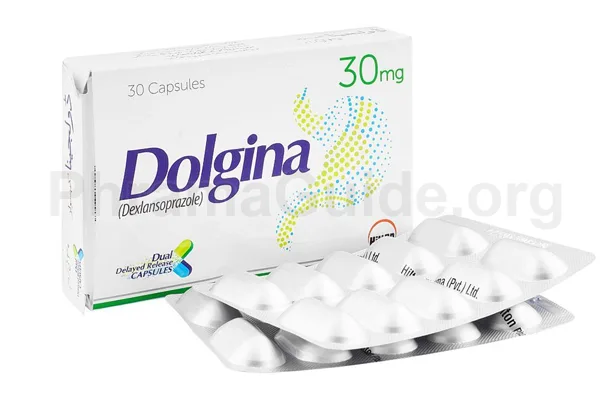Dolgina is a medication used to treat conditions like gastroesophageal reflux disease (GERD) and certain stomach/intestinal ulcers. Generally, Dolgina is considered a safe medication, but some individuals may experience side effects. Here are some common and less common side effects associated with Dolgina.
Common Side Effects
- Headache: Mild to moderate headaches can occur in some individuals using Dolgina.
- Nausea: Some people might experience feelings of queasiness or mild nausea.
- Diarrhea or Constipation: Digestive system changes like diarrhea or constipation can occur initially after starting the Dolgina capsules.
- Abdominal Pain: Some individuals may experience abdominal discomfort or pain.
- Gas or Bloating: Dolgina might cause increased gas production or a feeling of bloating in the stomach.
- Dry Mouth: A dry sensation in the mouth might occur.
- Fatigue: Feeling more tired than usual might be a side effect for some individuals.
- Joint Pain: Occasional reports of joint pain have been associated with the use of Dolgina.
- Vitamin and Mineral Deficiencies: Long-term use of Dolgina may lead to deficiencies in vitamins such as B12 and minerals like magnesium.
- Increased Risk of Infection: Long-term use of Dolgina might slightly increase the risk of certain infections, particularly gastrointestinal infections.
- Rebound Acid Hypersecretion: After discontinuation of long-term use of Dolgina therapy, some individuals might experience an increase in gastric acid secretion.
Less Common Side Effects
- Liver Problems: Rarely, Dolgina might cause liver problems, which could manifest as jaundice (yellowing of the skin or eyes), dark urine, or persistent nausea/vomiting.
- Skin Reactions: Some individuals may experience skin reactions such as rash, itching, or hives.
- Allergic Reactions: In rare cases, severe allergic reactions to Dolgina might occur, leading to symptoms like trouble breathing, severe dizziness, or swelling of the face, lips, tongue, or throat.
- Low Magnesium Levels: Long-term use of Dolgina might lead to low magnesium levels in the blood, which can cause symptoms like muscle spasms, irregular heartbeat, or seizures.
- Clostridium difficile Infection: Rarely, Dolgina has been associated with an increased risk of Clostridium difficile infection in the colon, which can cause severe diarrhea.
- Bone Fractures: Long-term use of Dolgina causes a slightly increased risk of bone fractures, particularly in older individuals.
- Vitamin Deficiencies: Dolgina may lead to deficiencies in certain vitamins, such as B12 and calcium.
- Respiratory Issues: Rarely, Dolgina might cause respiratory issues like cough or difficulty breathing.

What is Dolgina?
Dolgina is one of the leading brands of Dexlansoprazole, manufactured and marketed by Hiltin Pharmaceuticals (Pvt) Ltd, Pakistan.
Dolgina : Available Formulations and Strengths
Presently, Dolgina is available in only Capsule Form with the following strengths.
Dolgina Capsules : 30mg and 60mg strengths.
What Are The Possible Drug Interactions of Dolgina?
- Anticoagulants (Warfarin): Dolgina can interact with anticoagulants, such as warfarin, potentially increasing the risk of bleeding. Regular monitoring of blood clotting parameters is advisable when using these medications together.
- Digoxin: Dolgina might increase the absorption of digoxin, leading to elevated levels of digoxin in the blood. Monitoring for digoxin toxicity is recommended if both drugs are used concurrently.
- Methotrexate: Dolgina can interfere with the elimination of methotrexate from the body, potentially increasing the risk of methotrexate-related side effects. Close monitoring of methotrexate levels and possible dosage adjustments might be necessary.
- Ketoconazole and Itraconazole: These antifungal medications, when taken with Dolgina, may have reduced absorption due to the stomach acid-suppressing effects of Dolgina. It’s advisable to take these antifungal medications at least 2 hours before Dolgina.
- Clopidogrel: There’s some controversy regarding the interaction between clopidogrel (an antiplatelet drug) and proton pump inhibitors (PPIs) like Dolgina. Some studies suggest a potential reduction in the effectiveness of clopidogrel when used concomitantly with PPIs. Consultation with a healthcare professional is recommended if using both medications together.
- Atazanavir and Other HIV Medications: Dolgina might reduce the absorption of certain HIV medications, such as atazanavir, leading to decreased effectiveness. These medications should be taken at least 2 hours before Dolgina.
- Tacrolimus: Dolgina might increase the absorption of tacrolimus, a medication used to prevent organ rejection in transplant patients. Monitoring of tacrolimus levels and potential dosage adjustments might be necessary.
- St. John’s Wort: Herbal supplements like St. John’s Wort may decrease the effectiveness of Dolgina by increasing its metabolism, and reducing its concentration in the body.

Leave A Comment